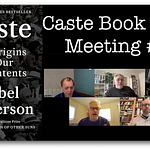In 2020 the BBC published an article purporting to revisit an unresolved “abominable” mystery that had “plagued” Darwin in his later years. I dug into it a bit and found it wasn’t even particularly original. Just a rehash of a failed argument from Darwin’s own era.
Slightly edited in Descript, and here’s the Transcript:
Hello, world. Today I want to do a little bit of an intervention into current events. Now, don't worry, it won't be anything as trivial as American politics, but I saw a BBC News article this morning titled, "New Light Shed on Charles Darwin's Abominable Mysteries".The mystery, apparently, was the extremely rapid, at least in geological time, explosion of flowering plants across the world, which didn't seem to match with Darwin's expectation that evolution proceeded very slowly. The maxim natura non facet saltum, Nature makes no leap, seems to have been the problem.
The article quotes it, but doesn't mention its source. It actually is attributed to Gottfried Leibniz. And it was later used as the epigraph in Alfred Marshall's Principles of Economics, which was first published in 1890. But Marshall began this book in 1881, just about the same time that Darwin was writing his final letter to his friend Joseph Hooker, fretting about this challenge to his theory presented by the quote unquote abominable mystery. The reason that the rapid rise of flowering plants was considered so abominable was that the keeper of the botany collection at the British Museum, William Carruthers, gave a lecture in 1876, which was covered, apparently, not only in the scientific press, but in the Times of London.
All of this is according to Professor Richard Buggs, the authority on whom the BBC science writer Helen Briggs bases her story today. The BBC article portrays Buggs' statement as new and important. The conclusion that a reader might draw is that this Carruthers speech has just been uncovered and it is a vexing problem with Darwin's theory. The article frames the issue as one that quote unquote haunted Darwin and describes, in their words, forgotten historical documents that show a rival scientist was arguing for divine intervention in the rise of flowering plants. Actually, that's not entirely true. Carruther's speech wasn't unknown, and it hasn't been recently uncovered by this enterprising young professor.
A quick web search produces a full text version that you can read yourself. In it, Carruthers begins his statements by paraphrasing Moses, whom he cites as the author of the Old Testament. He then mentions that at the beginning of the century, Lamarck had proposed his evolution hypothesis. But no one had paid much attention until Darwin had published his On the Origin of Species in 1859, which Carruthers says “wrought an almost complete change in opinion as to the origin of our present life forms”. This on the first page of the document. Interestingly, Carruthers very next words at the beginning of the following paragraph are an explanation that Darwin had never argued against a creator and had merely been describing the ways life developed after the divine creation. This is a bit of a misrepresentation of what Darwin actually said, but Darwin famously was vague on a lot of those issues.
Carruthers continues for another 14 pages or so, showing that in his judgment there is no fossil evidence for evolution. Lack of available evidence in this argument seems to be taken for the non- existence of evidence. As he's beginning to sum up his argument, which at that point was following the changes in the genus Salix, Caruthers mentions that "all beyond the testimony of our living willows is pure imagination, unsupported by a single fact. So that here, also, the evidence is against evolution, and there is none in favor of it." This on page 34. Caruthers concludes by returning to what he calls the Mosaic Narrative, the oldest scheme of creation. And he suggests that science should actually be trying to figure out how God did all that rather than looking for other explanations.
Of course, the Old Testament narrative that Carothers attributes to Moses is not challenged itself to produce any evidence in anything remotely similar to the way that Darwin's theory is rejected, simply because the British Museum doesn't happen to have any fossils of missing links. The BBC article today concludes that, quote, "the mystery is still unsolved."
Professor Buggs is given the final word and he says, "of course we've made lots of progress in our understanding of evolution and in our knowledge of the fossil record, but the mystery is still there." Really though, is it? As I'm reading this, my immediate questions are, who are these people? I Google Caruthers and I find out a little bit about him and that quick link to his speech.
Turns out he was also on the Publications Committee of the Presbyterian Church and he was the editor of the Presbyterian Messenger for Children at the time that he wrote this speech. And although he works at the University of London, Richard Buggs, it turns out, spends a lot of his time on his blog trying to reconcile what he calls quote, "conflict between genetics and the Abrahamic religions."
In a blog post titled, "Did Darwin Make Atheism Credible?" Buggs begins by asking, Imagine that my wife and I walk into our living room one morning to find that our son's toy box has fallen over, and pieces of Brio train set track are joined together in a perfect circle lying on the floor with a train on top. Buggs and his wife ponder on how this might have happened, and Buggs says he's going to start buying Brio stock because the odds are so slight, that this could have happened naturally, that the pieces could have fallen into that arrangement, that clearly there are way more Brio sets in the world. This, of course, is meant to be a joke.
Buggs goes on in the rest of the nearly 3, 000 word post, which has a link at the bottom of it to a video of a talk that he gave at Grace Church in Greenwich based on this material. The post is mostly devoted to taking down Richard Dawkins book, The God Delusion. The Dawkins book is very flawed, and I'm really kind of surprised that anyone is still arguing with it in March of 2020. But back to the joke, which shows a severe misunderstanding about the nature of probability. If the odds are a trillion to one against the Brio tracks falling randomly into that arrangement in a circle with the train on top, that does not mean that in order for it to happen, it needs to have been tried a trillion times before.
It is equally unlikely for a trillion to one event to happen on the first attempt as it is on the trillionth attempt. There being more Brio sets in the world does not mean that this seemingly miraculous event is going to be any more likely. By that logic, if there were a trillion sets, would it be certain to happen? If there were two trillion, would it be certain to happen twice? If you tossed a fair coin 11 times and it came up tails every time, what are the odds on try number 12? It may be counterintuitive, but they're 50/50. If not, then there's something wrong with the coin. So how does all this relate to this BBC article?
Well, do you see something different in the frame of the whole topic when you understand who these two scientists, Carruthers and Boggs are, and that they're both actually committed to a particular worldview? Is it just now a story about this unsolved mystery of evolution. Are you a little bit more interested in finding out whether in fact it has really been resolved or if it remains a mystery as we're being told? In the end, the lack of fossil evidence for missing links was a problem that frustrated researchers, not only in flowering plants, but also, of course, in the evolution of humans, where it was cited quite a bit. But once again, I think it comes down to a misunderstanding of probability. And that's why I spent all that time harping on Buggs's lack of appreciation for probability.
It's also why I mentioned the Leibniz maxim natura non facet saltum at the beginning. It turns out this is also incorrect, and that blindly accepting it just because Leibniz, a respected authority, said it once in an important text, is the same mistake that Caruthers and Buggs made with Moses and the Abrahamic traditions. In the 1970s, over 50 years ago, paleontologists Niles Eldridge and Stephen Jay Gould explained this with their theory of punctuated equilibrium. Change doesn't happen gradually in the archaeological record, it turns out. It happens abruptly. Natura, it turns out, does facet saltum. So if you have a multi million year fossil record, and 99, or 99. 9 percent of it, or more, represents the equilibrium stages rather than the abrupt change stages. What are you likely to find when you dig up fossils?
I wish there was a really good book about probability. I know that there are a couple, I've heard mixed reviews about the tone of them, so I've been a little bit hesitant to read them, but I may have to. So, when I do, I will probably have more to say about that, and I'll work it into my ideas about how I am going to teach these critical thinking techniques to my students. The message and the moral for today may be, that even though something comes from a respected news source like BBC News, scientists and science editors who are unaware of history are doomed to repeat it. I hope you found that interesting. Thanks for listening. I'll see you again next time.













Share this post